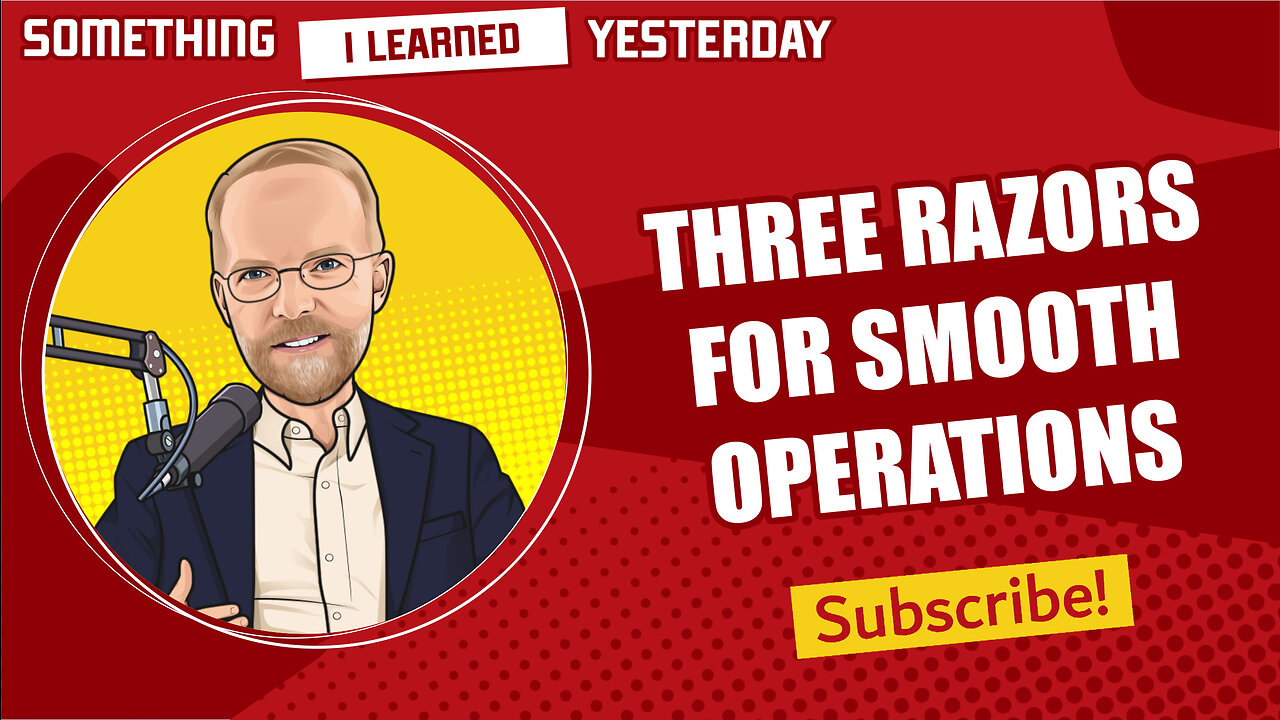Premium Only Content

133: Three razors for better operations, plus a riddle
Successful operations require aligning disparate systems toward a common goal. Sometimes those “systems” are people or groups of people. Krehbiel’s Razor is a mindset that breaks down barriers between people and helps find a way to solve problems and finish projects.
Sometimes the only way to solve a problem is to see it from someone else’s perspective.
You’ve probably heard of Occam’s razor, which says when there are two competing explanations, the simpler one is more likely to be true. That’s because for the more complicated explanation to be true, more unlikely things have to happen. The simplest explanation isn’t always right, but it’s more likely to be right.
Less well known is Hanlon’s razor, which says “Never ascribe to malice what is adequately explained by incompetence.” (Some people say stupidity instead of incompetence.) Napoleon is supposed to have said something along these lines.
Hanlon’s razor is a remedy for the unfortunate habit of assuming people have ill intent. Often they don’t. For example, when you’re not invited to the meeting or the party after work, it doesn’t necessarily mean the organizer was slighting you. There are other possibilities that don’t require malice – like they were using the wrong distribution list, or they simply forgot.
I read about Hanlon’s insight and thought it could be taken a step further. Krehbiel’s razor says “Don’t assume malice or incompetence when it might be a matter of a different perspective.”
For example, let’s say Joe wants to get the attention of some people on a Zoom call, so he starts waving his hand. He gets very frustrated when two people keep talking and don’t recognize him very obviously trying to get their attention. Then he realizes they might be on “speaker mode,” and they were only seeing the person speaking – not his hand waving. IOW, they had no idea he was trying to get their attention. They weren’t being rude, they simply had a different view.
Don’t assume other people are seeing what you’re seeing, or seeing it from your perspective.
Krehbiel’s Razor also applies to the conflicts between marketing and IT. When IT says they need a requirements document, it’s very easy for marketing to interpret that as “go away, kid, you bother me.”
No, they really do need a requirements document.
And when marketing keeps changing what they want, it’s easy for IT to assume they’re hopeless flakes who don’t know what the heck they’re doing. In reality, they might be testing new concepts. They might be responding to customer input, or they may have a new directive from management.
Better communication would certainly help in both cases, but you also have to assume the other person might have a valid but different perspective on the problem. IT has concerns marketing might not be aware of, and vice versa.
Krehbiel’s Razor also applies to how we talk about political or social issues. My preference would be that we didn’t (in professional settings), but if it has to happen, remember that other people might not share your point of view. It’s rude and inconsiderate to speak as if everyone agrees with your perspective on a complicated or controversial issue.
In summary, Occam’s Razor says to prefer the simple explanation, Hanlon’s Razor says people might be stupid rather than vicious, and Krehbiel’s Razor says you might be assuming malice or stupidity when you’re the stupid one. The other person is just seeing the problem in a way that you’re not.
-
 LIVE
LIVE
The Charlie Kirk Show
1 hour agoZelensky’s Setup? + Border Recovery | Sen. Mullin, Hemingway, Bensman | 3.3.25
7,766 watching -
 55:30
55:30
The Dan Bongino Show
4 hours agoThe Explosive White House Meeting That Changed Everything (Ep. 2434) - 03/03/2025
522K1.15K -
 DVR
DVR
Benny Johnson
2 hours ago🚨 AOC Going to JAIL For Leaking ICE Raid!? Trump to END Military Aid to Ukraine After WH Boss Move
50.4K93 -

Grant Stinchfield
1 hour agoThe Real Story Behind the War in Ukraine
109 -
 1:05:36
1:05:36
The Rubin Report
2 hours agoTrump & Zelenskyy’s First Reactions to Disastrous Meeting
40K28 -
 2:02:45
2:02:45
Steven Crowder
4 hours agoShould Trump Ditch Free-riding NATO After Zelensky Blowup?
359K248 -
 2:00:26
2:00:26
LFA TV
23 hours agoWALK AWAY FROM UKRAINE! | LIVE FROM AMERICA 3.3.25 11AM
34.5K26 -
 LIVE
LIVE
Flyover Conservatives
21 hours agoTucker, Sachs & the Truth About Zelensky That Changed Everything. Maine Transgender Protest. Kieran Culkin’s Viral Oscars Moment. | FOC Show
812 watching -
 1:04:41
1:04:41
Timcast
3 hours agoUK Vows To Deploy TROOPS Into Ukraine, Democrats CHANT WAR After Trump ROASTED Zelenskyy | Timcast
75.2K126 -
 DVR
DVR
Bannons War Room
13 days agoWarRoom Live
3.45M632